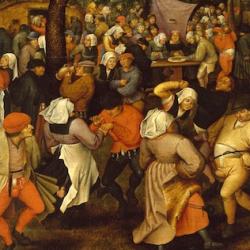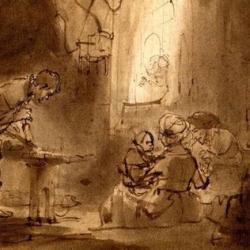In the Divine Institutes, Lactantius takes on Plato’s endorsement of common property. He makes a grudging admission that it might be “supported so long as it appears to refer only to money.” After all, “everyone should be wise enough to despise money!” (translation from From Irenaeus to Grotius, 48). Even with money, “it is both impossible and unjust.” But Plato’s suggestion that marriages should be common sets Lactantius off: “Males may crowd together like dogs to the same female, and whoever turns out strongest may have her; if, if they are patient like philosophers, they may take their turn, as in a brothel!”
Lactantius’s response isn’t merely one of disgust. Common property in wives means common parentage, and that destroys all social order:
What sort of a turmoil in human relationships is that! How can we preserve the loyalties of love (caritas) when our emotional attachments (quod ametur) are so insecure? How will a man ever care for (diliget) a woman or a woman for a man, if they have not lived together and created an inseparable bond of loyalty by devoted attention and sustained faithfulness to one another? That kind of virtue has no place in such a scene of promiscuous satisfactions. Then, if everyone were everyone else’s children, how could one love any children as one’s own, when one could not know with certainty that any children were one’s own? How could one honor someone as one’s father, when one could frame no idea of one’s origins.
Then the pithy conclusion: “The corollary of looking on the stranger as a parent must be to look on the parent as a stranger.”
A wise rebuke to the three-, four-, and infinite-parental families that are emerging these days.












